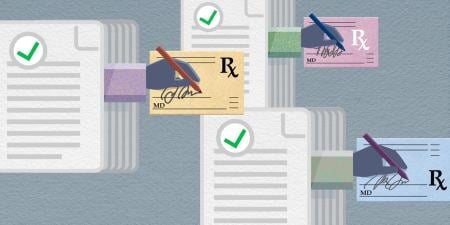Abstract
Many adults, physicians, and medical students search the internet for health information. Open access has many benefits, but the variable quality of internet health information—ranging from evidence based to false—raises ethical concerns. Using Wikipedia as a case study, this article argues that everyone engaging with internet health information has ethical responsibilities. Those hosting and writing for health websites should ensure that information is evidence based, accurate, up to date, and readable and be transparent about conflicts of interest. Health care professionals, including medical students, have both ethical responsibilities to help patients avoid false or misleading health information and practical opportunities to improve the quality of internet health information. All users of such information—professionals and patients alike—should develop critical appraisal skills and apply them to internet health information to distinguish the good from the junk.
Internet Health Information
The convenience, accessibility, and (often) free availability of internet health information makes it highly attractive. The information is found in many formats, including specialized websites, blogs, and social networking sites. In 2012, an estimated 72% of US adult internet users searched online for health information.1 Most users (77%) began their searches for health information using search engines; only 13% began their searches using specialized health websites, such as WebMD.1 However, concerns have been raised about people’s abilities to effectively search for information, comprehend what they find, and cope with the volume and variable quality of information.2-4
Moreover, the accuracy of internet health information varies greatly. For example, in a study of the quality of online information on mental health, two-thirds of the websites had content rated as good quality using DISCERN, an objective, validated instrument for measuring the quality of written health information.3 A systematic review of information about preoperative fasting on 87 websites, including health care institution websites, found that 55% included at least one recommendation that contradicted evidence-based guidelines.4 Of great concern, websites of health care institutions were more likely to have inaccurate information. Overall, the researchers assessed the quality and readability of the information as poor using validated instruments.
In addition to general health information, research has examined the quality of internet health information about specific conditions. In a United Kingdom (UK) study, online information on rhinoplasty, one of the most common surgical procedures performed, was found to be generally of low quality, unreliable, and difficult to read on the basis of objective measures.5 Another study examined the portrayal of online health information in US and UK newspaper articles about health, most of which referenced a website. The coders rated 47% of the articles as excellent quality, 33% as average or good quality, and 20% as poor quality.2 Yet another study examined information on dengue, a significant health problem in developing countries.6 Among the websites examined, 46% were evaluated as excellent, 15% as good, 18% as fair, 9% as poor, and 11% as very poor using an objective measure of quality. Other studies could be cited to show that the quality of health information on the internet is highly variable.3
Given this variability in quality, online health information must be critically appraised to distinguish between what is reliable and what is not. Clinicians—especially those using the internet for informal professional education7—have an ethical obligation to use their critical appraisal skills to help patients avoid false or misleading health information. One of the most common sources of online health information is Wikipedia, with over 70% of physicians using it for health care information,8 as well as over 90% of medical students.9 Given its popularity, Wikipedia provides an interesting case to examine the ethical obligations of clinicians regarding internet health information.
The Wikipedia Case
Since launching in 2001, Wikipedia has become the fifth most popular website in the world, containing millions of articles in hundreds of languages.10 As of March 2017, medical topics were covered in 30 000 English-language articles and 164 000 articles in other languages.9 As a “wiki,” anyone can add, delete, or edit pages, raising concerns about the quality of its information. Some studies have found Wikipedia to be of comparable quality to other sources of general health information, but others have not been so positive. One study focused on the 10 most costly US health conditions and whether Wikipedia made assertions that conflicted with evidence in peer-reviewed articles.11 Using Wikipedia articles from 2012, the research found statistically significant disagreement between Wikipedia and peer-reviewed sources for 9 of the 10 conditions. The one exception was an article on concussions, which the researchers noted was contributed by those with more expertise than the contributors of the other 9 articles.
Findings like these have led some to discourage the use of Wikipedia for health information, while Amin Azzam, MD, who teaches a course on editing Wikipedia for medical students, argues that physicians “have a moral obligation” to engage actively with such websites.12 The openness of Wikipedia can thus be seen as an opportunity to address its limitations. In 2004, WikiProject Medicine was founded by a physician to engage those with medical training in editing Wikipedia medical articles.9 It continues to be one of Wikipedia’s most active editing groups, primarily composed of health care professionals, researchers, and students.9 Around the same time, medical students at some universities were offered course credit to edit Wikipedia pages for courses teaching critical appraisal skills.12
Wikipedia also sought to improve its quality through collaborations. Since 2012, Wikipedia has collaborated actively with the Cochrane Collaboration and its over 30 000 contributors, mostly health care professionals and researchers. Cochrane is an international nonprofit organization that produces systematic reviews of health interventions that are seen by many as the gold standard for rigor and reliability.13 Other collaborations have been developed with Wikipedia to encourage active engagement by those with relevant expertise. For example, some peer-reviewed journals encourage, or sometimes require, authors to develop a Wikipedia page to accompany their published article; the Public Library of Science dual publishes broad review articles in its journals and in Wikipedia; and Translators without Borders, a nonprofit organization, has translated Wikipedia medical pages into over 100 languages.9 Other initiatives have been internal to Wikipedia, such as checks on the quality of both the content and the editing of medical articles. While the quality across the massive website remains variable, recent assessments are showing improvements.9 This finding demonstrates how an ethical commitment to promoting the accuracy of health information on the internet can bring demonstrable improvements that help protect patients from false or misleading information.
Ethical Principles
The types of improvements that Wikipedia has sought are motivated by a number of ethical principles that should apply to all internet health information. Foremost among these is the importance of promoting the general good and avoiding harm to users of the information. One way to do this is by ensuring that the best available evidence informs the content.
High-quality health care involves core commitments to safety, effectiveness, patient-centeredness, and equity, among others.14 Each of these commitments can be linked to ethical principles: for example, patient-centeredness is based on respect for persons, and safety is based on nonmaleficence.15 Such commitments and ethical principles apply equally to clinical practice and internet health information. Patient-centeredness, for example, should lead authors of website content to provide health information in clear and easily readable ways. To ensure that patients spend their limited resources on effective interventions and are not harmed by false claims, authors of website content should also ensure that information comes from credible sources that are backed up by high-quality evidence and references. When relevant, authors of website content should identify the type of study design and link to a description of it so that readers can inform themselves of the strengths and limitations of each type of evidence. Most elements of evidence-based practice can thus be shown to be informed by ethical principles and values.15
A number of ethical principles similar to those discussed above were articulated in the 2000 e-Health Code of Ethics.16 The guiding principles are summarized in the table. In addition, the document accompanying the Code discusses several ways to put these principles into practice.
| Ethical Principle | Description |
|---|---|
| Candor | “Disclose information that if known by consumers would likely affect consumers’ understanding or use of the site or purchase or use of a product or service.” |
| Honesty | “Be truthful and not deceptive.” |
| Quality | “Provide health information that is accurate, easy to understand, and up to date. and Provide the information users need to make their own judgments about the health information, products, or services provided by the site.” |
| Informed consent | “Respect users’ right to determine whether or how their personal data will be collected, used, or shared.” |
| Privacy | “Respect the obligation to protect users’ privacy.” |
| Professionalism in Online Health Care | “Respect fundamental ethical obligations to patients and clients. and Inform and educate patients and clients about the limitations of online health care.” |
| Responsible Partnering | “Ensure that organisations and sites with which they affiliate are trustworthy.” |
| Accountability | “Provide meaningful opportunity for users to give feedback to the site. and Monitor their compliance with the e-Health Code of Ethics.” |
| © Helga Rippen, Ahmad Risk. Adapted from Table 1 in “e-Health Code of Ethics,” originally published in the Journal of Medical Internet Research (http://www.jmir.org/2000/2/e9/)16 and distributed under the terms of the Creative Commons Attribution License (http://www.creativecommons.org/licenses/by/2.0/), which permits unrestricted use, distribution, and reproduction in any medium, provided the original work is properly cited. | |
Although not explicitly mentioned in the Code, conflict of interest is another important ethical consideration. Users of internet health information must determine if the content is trustworthy, so authors should disclose any conflicts of interest that can intentionally or unintentionally introduce bias into the content. One of the reasons Wikipedia introduced stricter oversight policies for medical content was that employees of companies with commercial interests were found to be adding and deleting information so that articles portrayed their products in more favorable ways.17 While such marketing strategies might be acceptable in some commercial realms, there are reasons to regard applying such strategies to health information as unethical.
The potential for conflicts of interest to introduce bias into online health information reached a new level in 2014 as a new group of top-level internet domain names (like the familiar “.com” and “.edu”) were being released. Among these were “.health” and 17 other health-related names.18Despite objections from the World Health Organization and many medical informatics experts, the names were allocated “to the highest bidders,” according to critics, rather than by what would best promote and safeguard public health.19 According to the CEO of DotHealth, the company that eventually won the contract to administer domain names with .health in them, removing anything other than harmful and illegal information “in the name of ‘quality’ is a dangerous precedent that amounts to potential censorship of free speech at worst and favoritism at best.”19 Critics claimed they were not arguing for censorship but that, given the credibility and trust inherent in a .health website name, transparency should be the guiding ethical principle for health information websites.19 This means that those hosting and writing for health websites should be transparent about who they are and any conflicts of interest they might have so that readers can evaluate the trustworthiness or potential bias of the information. Those hosting interactive websites should also be transparent about how the privacy and confidentiality of any user-provided information will be protected.19
Justice is another important ethical principle in the context of the internet. The widespread availability of the internet is frequently noted, but not everyone has easy, affordable, and reliable access to it. This disparity can occur for several reasons, including poor infrastructure, the costs of access or equipment, or lack of internet technology or health literacy. If only those with certain incomes can access “free” health information, websites can unfairly or unjustly give preferential prominence to the health concerns of those with higher incomes and neglect the concerns of those with lower incomes. Some attempts have been made to counteract these tendencies. For example, while Wikipedia medical content is still skewed towards English, a collaboration with Translators without Borders is helping to ensure articles are available in a wider range of languages.9
Other practical approaches to addressing quality include ways to credential health websites. The Health on the Net Foundation (HON) is a Swiss nongovernmental organization seeking to improve the reliability and credibility of health and medical information on the internet.20 It does this via a code of conduct that provides HONcode certification to websites that agree to adhere to these ethical standards. Each year, websites need to be re-evaluated and recertified, although HON does not evaluate the quality of the information on the website.21 HONcode certification is widely used as an indicator of higher-quality information, for which some independent research has found supportive evidence.22 However, researchers have found that some websites displaying HONcode certification were not in compliance with all of the code’s principles,22 and another study found a weak correlation between HONcode certification and the quality of website health information.3
Other deeper and less tangible ethical issues arise in the context of internet health information, which will only be mentioned here.18 One issue is how patients using the internet instead of engaging with clinicians to diagnose, investigate, and possibly treat their health conditions will impact their health and how they view their conditions. It would be problematic if patients engaged in endless internet searching for explanations of their symptoms or conditions or came to hold false beliefs about them, especially if consultation with health care professionals could provide clearer answers. For example, the term “cyberchondria” has been coined for the exacerbation of health anxiety following frequent internet searching for health information.1 A second issue is how the internet will impact patient-professional interactions and relationships as patients come to professionals with more information gleaned from the internet. While information gathering can be beneficial, it can also lead to problems if patients come to hold false beliefs and adamantly adhere to them despite strong evidence to the contrary.
Conclusion
Health information on the internet highlights the value of access to information. As such, it is a public resource that should be used for the public good. Health information can promote health, but it also has the potential for harm if it promotes false beliefs or is misleading. To the degree information is evidence based, honest, reliable, and understandable, it can promote good. To the degree it is misleading, biased, or inaccurate, it can lead to harm—either by giving readers incorrect recommendations or by diverting them from good courses of action. The variable quality of information on the internet creates ethical responsibilities for all involved with internet health information: providers, professionals, and the public. Providers of online health information should ensure their websites adhere to ethical standards like those discussed here. Health care professionals should engage with patients about the information they access and help them critically appraise it so that they can evaluate health information better themselves. It is important not only to critique low-quality websites but also to become involved in initiatives to help improve what is available online. Many opportunities exist to improve internet health information, enabling medical professionals to contribute to public health and public good. The flip side of open access to so much health information is the ethical responsibility to critically appraise that information. The internet has reaffirmed for another generation the Latin aphorism caveat lector (let the reader beware).
References
-
Fox S, Jones S. Health online 2013. Washington, DC: Pew Research Center; January 15, 2013. http://www.pewinternet.org/2013/01/15/health-online-2013/. Accessed September 20, 2018.
-
McCaw BA, McGlade KJ, McElnay JC. Online health information—what the newspapers tell their readers: a systematic content analysis. BMC Public Health. 2014;14:1316. doi:10.1186/1471-2458-14-1316.
- Grohol JM, Slimowicz J, Granda R. The quality of mental health information commonly searched for on the Internet. Cyberpsychol Behav Soc Netw. 2014;17(4):216-221.
- Roughead T, Sewell D, Ryerson CJ, Fisher JH, Flexman AM. Internet-based resources frequently provide inaccurate and out-of-date recommendations on preoperative fasting: a systematic review. Anesth Analg. 2016;123(6):1463-1468.
- Haymes AT. The quality of rhinoplasty health information on the internet. Ann Plast Surg. 2016;76(2):143-149.
-
Rao NR, Mohapatra M, Mishra S, Joshi A. Evaluation of dengue-related health information on the internet. Perspect Health Inf Manag. 2012;9:1c. https://www.ncbi.nlm.nih.gov/pmc/articles/PMC3392950/. Accessed September 20, 2018.
-
Schmidt T. Informal education of medical doctors on the Internet. Stud Health Technol Inform. 2013;190:92-94.
- Hughes B, Joshi I, Lemonde H, Wareham J. Junior physician’s use of Web 2.0 for information seeking and medical education: a qualitative study. Int J Med Inform. 2009;78(10):645-655.
- Shafee T, Masukume G, Kipersztok L, et al. Evolution of Wikipedia’s medical content: past, present and future. J Epidemiol Community Health. 2017;71(11):1122-1129.
-
Collins J. The top 10 most popular sites of 2018. Lifewire. April 12, 2018. https://www.lifewire.com/most-popular-sites-3483140. Accessed May 1, 2018.
- Hasty RT, Garbalosa RC, Barbato VA, et al. Wikipedia vs peer-reviewed medical literature for information about the 10 most costly medical conditions. J Am Osteopathic Assoc. 2014;114(5):368-373.
-
Beck J. Doctors’ #1 source for healthcare information: Wikipedia. Atlantic. March 5, 2014. https://www.theatlantic.com/health/archive/2014/03/doctors-1-source-for-healthcare-information-wikipedia/284206/. Accessed May 1, 2018.
- Smith R. The Cochrane Collaboration at 20: much has been achieved, but much remains to be done. BMJ. 2013;347(7938):3-4.
- Baily MA, Bottrell M, Lynn J, Jennings B. The ethics of using QI methods to improve health care quality and safety. Hastings Cent Rep. 2006;36(4):S1-S40.
-
O’Mathúna DP. Ethical considerations for evidence implementation and evidence generation. In: Melnyk B, Fineout-Overholt E, eds. Evidence-Based Practice in Nursing & Healthcare: A Guide to Best Practice. 3rd ed. Philadelphia, PA: Wolters Kluwer; 2015:515-530.
-
Rippen H, Risk A. e-Health Code of Ethics. J Med Internet Res. 2000;2(2):e9. doi:10.2196/jmir.2.2.e9.
- Fleck F. Online encyclopedia provides free health info for all. Bull World Health Organ. 2013;91(1):8-9.
- Solomonides AE, Mackey TK. Emerging ethical issues in digital health information. Camb Q Healthc Ethics. 2015;24(3):311-322.
-
Eysenbach G. The new health-related top-level domains are coming: will cureforcancer.health go to the highest bidder? J Med Internet Res. 2014;16(3):e73. doi:10.2196/jmir.3358.
-
HON (Health On the Net) website. https://www.hon.ch/en/. Accessed September 7, 2018.
-
HON (Health On the Net). HONcode. https://www.hon.ch/HONcode/Webmasters/. Accessed September 7, 2018.
- Chumber S, Huber J, Ghezzi P. A methodology to analyze the quality of health information on the internet: the example of diabetic neuropathy. Diabetes Educ. 2015;41(1):95-105.



